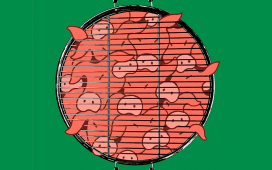Once upon a time, in New York, we measured our lives in Richard Foreman productions. For decades, the crocus of our theatrical spring was the widespread wheat-pasting of his black-and-white posters on various downtown walls and construction sidings, with wild-eyed clip-arty faces and carnival-barker fonts screaming titles like “WAKE UP, MR. SLEEPY! YOUR UNCONSCIOUS MIND IS DEAD!” The plays themselves, avant-garde larks that both sprang from and addressed Foreman’s deepest mental architecture, took place on rococo grids of gilt furniture, where his large ensembles moved around like deranged chess pieces. Striped strings broke up the theatre’s aerial volume, inspired, Foreman once said, by the tension hawsers and trapeze rigging in a circus tent.
This year, after a long dormancy, a version of that old circus is back in town. Foreman worked, occasionally, with theatres other than his own, and in 1988 he directed his trippy Presidential dream play “Symphony of Rats” with the Wooster Group. Now, with Foreman largely retired (his last theatrical production was in 2013), the Woosters have remounted, and significantly reënvisioned and recut, “Symphony of Rats” at the Performing Garage, stripping away the original’s suit-and-tie costumes and robot chorus, and interpolating modern sci-fi references as well as chunks of D. H. Lawrence and William Blake. Foreman’s own work was waggish, so the Off Off Broadway Wooster production is frequently tongue-in-cheek. On one of the set’s many screens, for instance, we see a clip from the 2002 horror film “Ghost Ship,” in which cruise-ship passengers are sliced in two when a wire whips across the deck. Twang: it’s a Foreman string—but this time, it drips blood.
I would be fibbing if I said I understood what happens in “Symphony.” I know we begin with a President, played by the Wooster Group stalwart Ari Fliakos, receiving interplanetary transmissions—or hallucinating that he has—some of which seem to beckon him into galactic diplomatic missions. In conversations with doctors, factotums, an alien intelligence, and someone I came to believe is an astronaut whose helmet is a basketball hoop (the gravel-voiced Guillermo Resto), the boyish President confesses his concerns. “I’ve gotten messages from outer space,” he says. “In my official capacity, these messages have come through to me. They reveal to me that the end of our world approaches.” (The sound designer, Eric Sluyter, works a complex magic, so that some of the heavily processed voices seem to be coming from out near the Andromeda galaxy.) The President finds out about a planet where the women make artificial food; perhaps they can help? He is certainly the object of medical concern—attendants put him through diagnostic scanners and puzzle over his stool—but these assistive figures also occasionally turn into rats (they scuttle, or they put on little blue ears and long, creepy fingernails), or maybe they just share his dream.
The piece’s co-directors, Elizabeth LeCompte (who also designed the production) and Kate Valk, have refit this “Symphony” with the Woosters’ own visual characteristics: if you saw “The Mother”—or really many of their shows in the past decade—you’ll recognize the way the actors sit at a row of black tables right up at edge of the stage near the audience, as if they’re presenting at a conference, with a litter of microphones and screens on easels and walls in a scrum behind them. The Woosters, too, have been using ropes and rigging as a decorative element, and here they stretch a low wire wall-to-wall just in front of the audience, to whiz a wooden panel back and forth when they change the scene. (It recalls, in its lo-fi editing way, a “Star Wars”-ish wipe cut; later there will be a snippet of dialogue from “Return of the Jedi.”)
The most striking addition to their dark jumble shop are several balls, such as a soccer ball and the bright red sphere of a punching bag, on stands, which turns the whole room into a janky orrery—a model of a planetary system—with a Spalding basketball playing the Earth. (Could this be a reference to the much-missed co-founder of the group, Spalding Gray? We do see his name, again and again.) Everything’s high-tech but deliberately crummy: Fliakos wears the kind of dun-colored tank top and many-zippered pants that you’d expect on the engineering mate of an interstellar cargo tug, and when the screens play snippets of video, it’s flotsam like “Ghost Ship” or a YouTube cooking tutorial, or, in one extended sequence of homoerotically tinged violence, a murderous scene from “The Suicide Squad.”
Logic is choreographic and compositional rather than intellectual and linear. Our own internal divisions between thinking and unthinking, id and superego (“the mirror mind at work, Mr. President”) are reflected in the show’s many doubles. Fliakos’s chief foil is Jim Fletcher, another Wooster veteran, who wears a doctor’s coat and croaks out Suzzy Roche songs about, among other things, ice cream. Fletcher’s thrumming, didgeridoo voice—violently tuneless when singing and melodic in speech—is a counterpoint to Fliakos’s light, almost nasal timbre; Niall Cunningham and Andrew Maillet, as the President’s assistants, are their balancing male pair. (Cunningham and Maillet sing like angels.) “He made a decision—ooo / followed by another decision, / And by that method / introduced mystery into life,” Fletcher says, describing the President to himself. Still, reflection or not, our un-mind does not always have our best interests in view. Fletcher carries various totems that distract the President: a picture of a tiger (the cast recites from Blake’s “The Tyger”) or a rock that is simultaneously a ball that “looks like the center of the universe.” Sometimes the President puts on sunglasses and stands in a half column, pondering levels of reality, but Fletcher’s mad doctor always lures him back, away from contemplation. Heavy lies the head that wears cool shades.
Those sunglasses are the only oblique reference to our current President that I recognized—Foreman is an expressionist writer rather than an expressly political one, and the experience of watching “Symphony” was, for me, totally escapist. “Suppose we had a President who allowed their imagination to function full time,” Fliakos muses in voice-over, yet I did not experience even one single pang about the deranged reality of our own time. Instead, I thought about the intellect and its (chief) executive functions: the way we elect our poor brain to make our decisions and never let it rest. “Symphony” ’s level of discombobulation is a kind of rest. I found that it was enough to be carried along by the Wooster Group in full flood, with Fliakos giving one of the finest performances I’ve ever seen him give, full of laughter and a radiating sense of pleasure in his new Presidential discoveries. His much-examined body is treated like an invalid’s, but his mind seems so free! The Performing Garage situates the audience high up, as if we’re in an operating theatre, and this time the way he turns his eyes up to us—though he’s probably just looking at the screen over our heads—had a buoyancy to it that I’m unused to in Wooster Group shows.
Perhaps all avant-gardes come to this: the most adventurous, difficult, boundary-pushing artists become a comfort, as they hew to experiments that have now been run for decades. It’s been a weird time lately, with years lost to the pandemic, and uptown Broadway seasons so overbalanced and ill-timed that it seems to be experiencing a whole year’s worth of openings in three weeks. But sitting with the Wooster Group, listening to a Foreman text and feeling that old disorientation, I felt as though time was finally in its joint. At one point, Fletcher allows a weird dribble of ice cream to drool out of his mouth, and down a cardboard cone—why? I could not tell you. But it did remind me of the turning seasons. Ice cream, you say? And a Foreman play? Must be spring. ♦








